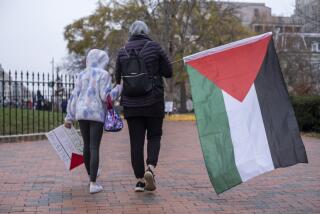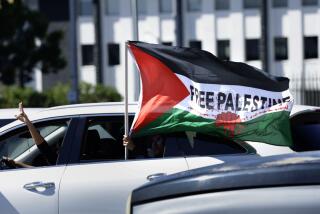Memories of screams, echoing in the torture chamber
- Share via
BAGHDAD — Suhan Zubaidi’s earliest memory is of the day Saddam Hussein’s security forces gunned down her uncle.
“I was a small kid playing in front of my house,” she said. “I saw my aunt keening, and there was blood on the ground. I couldn’t understand why.”
Zubaidi and her family were members of the Iraqi Communist Party, which was viciously persecuted under Hussein. Her father died a week after he was released from prison.
“We barely had a chance to take photos with him,” said the feisty minibus driver in pink lipstick and green eye shadow, telling her story over a lively and emotion-charged lunch at a Baghdad hotel with two other women who have borne witness to the Iraq Memory Foundation.
Her uncle and father were among the first of many relatives to be imprisoned, tortured and killed. Zubaidi fought back by having as many children as she could, until her husband too was gunned down. Their 14th child was born soon after. She named him Hosam -- “ending.”
Lately, it has become harder for the foundation to persuade survivors to tell their stories. Many agree at first, but back out when confronted with a video camera, interviewer Addu Hashimi said.
For women brought up in a conservative Muslim society, it can be especially daunting to discuss what was done to them. Majde Jabouri, another Communist Party member, was vilified by her tribal elders when her interview aired on Iraqi television.
“Why should I be ashamed?” she asked, still seething. “Those people who were complaining, where were they when I was arrested? Didn’t I belong to a tribe? Why weren’t they angry then?”
The first time Jabouri was detained, her interrogator stripped her and kicked her so hard that she suffered two slipped disks. “My hair was long,” she said, “so he would wrap it around his hand and knock my head against the wall.”
When Shamiran Odisho was arrested with a bagful of Communist Party leaflets, the only space at the security directorate that wasn’t already stuffed with detainees was the torture chamber. So that is where she was held. Each morning, her interrogators came in to torture her, then took her blindfolded into the hallway, where she could hear the next person’s screams.
“Every time I went into that room, the screams would echo in my head,” she said. “I never could sleep, because I was always afraid they would come back and start the torture again.”
She told her story because she believes Iraqis will one day take pride in the women who stood up to Hussein’s brutality. “Now, we are living in chaos,” she said. “But when this chaos falls away, people will be looking and searching for this history. We are setting the foundation of this history for them.”
--
More to Read
Sign up for Essential California
The most important California stories and recommendations in your inbox every morning.
You may occasionally receive promotional content from the Los Angeles Times.













